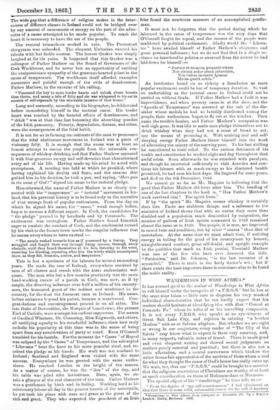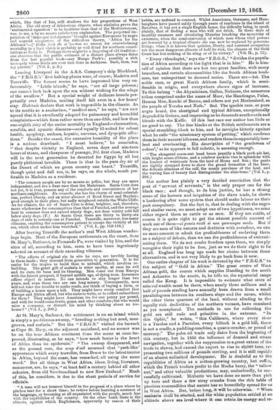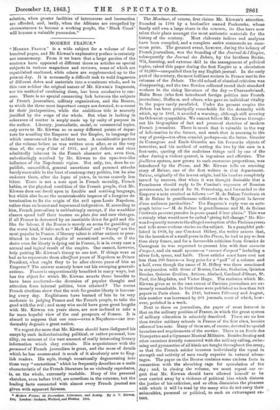WANDERINGS IN WEST AFRICA.*
IT has seemed good to the author of Wanderings in West Africa to veil himself under the incognito of" a F.R.G.S," but he has at the same time taken so little care to disguise his very marked individual characteristics that he can hardly expect that -his readers should hesitate at identifying him with that "Consul at Fernando Po" whom he talks of as his travelling companion. It is not every F.R.G.S. who speaks as an eye-witness of Great Salt Lake City, and rejoices in saluting "a brother Moslem" with an as Salamis alaylcum. But whether we are right or wrong in our conjecture, every reader of "The City of the Saints" may know what to expect in these very amusing, and, in many respects, valuable notes of travel. There is much good and even eloquent writing and shrewd sound judgments on matters purely material and practical ; but there is also not a little affectation, and a mental narrowness which hinders the writer from a fair appreciation of the motives of those whom a zeal for what they thought the cause of God's house has really eaten up. We wish, too, that our "F.R.G.S." could be brought to remember that the religious convictions of Christiana are worthy of at least as much consideration as those of Mohammedans or Mormons.
The special object of his "wanderings " he thus tells us
From the depths of 'my sell-consciousness" I had eliminated an idea that there is some solid, substantial reason for the veil of mystery
"Wanderings in West Africa, .from Liverpoot to Fernando Po. By a F.R.G.S London: Tinsley Brothers. 1868. -which, like that of Isis' still shadows the fair proportions of West Africa. The old story of deleterious climate, when statistics prove the 'sentimental squadron' to be healthier than that of the Mediterranean, was, to me, a by no means satisfactory explanation. The perpetual im- putation of improper indulgences' brought against Europeans by negro and negroid supporters of the ridiculous theory, Africa for the Africans '—(' Italia fin-a do se ')—was no reason for overwhelming mortality in a land which is probably as well fitted for northern consti- tutions as India is. Perhaps there might be a lingering of old tradition : one observes that the public estimate of a distant place always dates from the last popular book—say Mungo Park's ; possibly a rich monopoly whose deeds are ever best done in darkness. Such, then, was my pursuit." (Vol. I., p. 5.)
Leaving Liverpool in the A.S.S. Company's ship Blackland, the " F.R.G.S.'s" first halting-places were, of course, Madeira and
Teneriffe. The former seems to have impressed him very tin- favourably. "Little islands," he says, "are all large prisons ; one cannot look look upon the sea without wishing for the wings of the swallow." But a special weight of dullness broods per- petually over Madeira, making itself felt even in a few hours' stay. Habitues declare that work is impossible in the climate. As to its merits as a sanitarium, "medical men," he says, "are now agreed that it is excellently adapted for pulmonary and bronchial complaints—which form rather more than one-fifth, and less than one-eighth (sic) of the entire mortality in England—rheumatism, scrofula, and zymotic diseases—and equally ill-suited for robust health, apoplexy, asthma, hepatic, nervous, and dyspeptic affec- tions." Besides the ennui, the excessive humidity of the place is a serious drawback. "I must believe," he concludes, "that despite vicinity to England, seven days and nineteen hours of steam, and cheapness of passage, 20/. first class, Madeira will in the next generation be deserted for Egypt by all but purely phthisical invalids. There is that in the pure dry air of the Desert of which no green country can boast." Teneriffe, though quiet and dull too, is, he says, on the whole, much pre- ferable to Madeira as a residence.
"The common people are by no means so polite, but they are more independent, and are a finer race than the Madeirans. Santa Cruz does not yet, it is true, possess any of the comforts and conveniences of her northern neighbours. En revanche, she has the charm of semi-oriental- ism, perfect liberty, and an utter absence of Bond Street and Mayfair; good enough in their place, but sadly misplaced outside the White Cliffs. As for climate, the air of Santa Cruz is drier, brighter, and, therefore, more wholesome for consumptives than that of Funchal, and the average heat in summer does not exceed ninety degs., nor does wintry cold fall below sixty degs. (F.) At Santa Cruz there are thirty to thirty-six days of rain to seventy-one at Funchal. Teneriffe, moreover, has many climates, enabling the consumptive patient to escape the vicinity of the sea, which often makes him wretched." (Vol. I., pp. 112-114.) After leaving Teneriffe the author's real West African wander- ings begin. Most of the European settlements on the coast, from St. Mary's, Bathurst, to Fernando Po, were visited by him, and the sites of all, according to him, seem to have been ingeniously selected on account of their exceeding vileness.
"The effects of original sin in site he says, are terribly lasting in these lands ; they descend from generation to generation. It is far easier for the tropics to build than to unbuild, which involves re- building. The great gift of malaria is utter apathy, at once its evil and its cure, its bane and its blessing. Men come out from Europe with the fairest prospect, if beyond middle age, of dying soon. Insurance offices object to insure. No one intends to stay longer than two years, and even these two are one long misery. Consequently, men will not take the trouble to make roads, nor think of buying a farm, or of building a house upon a hill. They might have every comfort that Europe and Africa afford, but who cares to write, or to collect subscribers for them ? They might have American ice for one- penny per pound, and with ice would come fruits, game, and other comforts ; but who would raise a company, or disturb his mind by thinking about an ice- house ? " (VoL I., p. 200.) At St. Mary's, Bathurst, the settlement is on an island which is simply a pestiferous swamp, "breeding nothing but mud, man- groves, and malaria." But the "F.R.G.S." visited the barrack at Cape St. Mary, on the adjacent mainland, and no sooner was he on the true African continent than the scene at once im- proved, illustrating, as he says, "how much better is the heart of Africa than its epidermis." "The swamp disappeared, and as the ground rose, the coup d'ctil assumed that park-like' appearance which every traveller, from Bruce to the latest tourist in Africa, beyond the coast, has remarked, all using the same word." But all things in West Africa, ideas, living, literature, commerce, are, he says, "at least half a century behind all other colonies, from old Newfoundland to new New Zealand." Much of this, he considers, is due to the short periods of service for officials.
" A man will not interest himself in the progress of a place where he pitches tent for a short time ; he retires before learning a sentence of the language, or becoming at all acquainted with the people, much less with the capabilities of the country. On the other hand, there is the climate, against which Englishmen, apparently by reason of their,
habits, are unfitted to contend. Whilst Americans, Germans, and Hans- burghers have passed safely through years of residence in the island of Zanzibar, it has not a single English house, the difficulty being, to speak plainly, that of finding a man who will not drink. In these days of monthly steamers and circulating libraries breaking the monotony of existence, when the semi-starvation of which men whose vital powers are lowered by a tropical climate die can now be replaced by generous living; when it is known that quinine, liberty, and constant occupation rob the most dangerous climate of half its risk, the climate of the Gold Coast has lost nothing of its sting or of its victory." (VoL p. 75)-
"Every ethnologist," says the "F.R.G.S.," "divides the popula- tion of Africa according to the light that is in him." He is him- self of opinion that there are but two great families, with many branches, and certain abnormalities like the South African bush- men, too unimportant to demand notice. These are—lst. The noble race, or great North African family, which is semi- Semitic in origin, and everywhere shows signs of increase.
To this belong "the Abyssinians, Gallas, Nubians, the numerous tribes comprised under the name of Moor, the Mandengas, Fulls, Haussa Men, Kaniki of Burnu, and others not yet Moslemized, as the people of Yoruba and Nufe." 2nd. The ignoble race, or pure negro breed, the aboriginal and typical African, exceptionally degraded in Guinea, and improving as he descends southwards and blends with the Kaffm Of this last race our author has little or
no good to say. The free blacks at the British settlements are a
special stumbling-block to him, and he inveighs bitterly against what he calls "the missionary system of petting," which confirms them in their natural idleness, and renders them insupportably inso- lent and overbearing. His description of "the gentleman of colourV as he appears in full toilette, is amusing enough.
"The elongated cocoa-nut head bears jauntily a black pork-pie hat, with bright azure ribbons, and a rainbow necktie vies in splendour with the loudest of waistcoats from the land of Moses and Son ; the pants are tightly strapped down to show the grand formation of the knee, the delicate slimness of the calf, the manly purchase of the heel, and. the waving line of beauty that distinguishes the shin-bone." (VoL L, p- 208.) Our author has plainly a very decided conviction that the post of "servant of servants," is the only proper one for the
black race ; and though, to do him justice, he has a strong sense of the horrors and iniquities of the slave trade, Ile shows a hankering after some system that should make labour on their part compulsory. But the fact is, that in dealing with the negro and similar races, we must adopt one of two hypotheses, we must either regard them as cattle or as men. If they are cattle, of course it is quite right to get the utmost possible amount of work out of them—si possis recti si non quocunque nzodo. But if they are men of like natures and destinies with ourselves, we can
no more consent to admit the profitableness of enslaving them as a subject of debate, than we can the profitableness of extermi- nating them. We do not confer freedom upon them, we sina ply recognise their right to be free, just as we do their right to he at all. England has long ago made her choice between these alternatives, and is not very likely to go back from it now.
One entire chapter of his work is devoted by the" F.R.G.S." to the subject of "Gold in Africa." The great centre of West African gold, the source which supplies Manding to the north and Ashantee to the south, is, he tells us, the equatorial range called the Kong. It is impossible to estimate what store of mineral wealth must be there, when nearly three millions and a half of pounds sterling have annually been drawn from a small
parallelogram between its southern slope and the ocean, whilst the other three quarters of the land, without alluding to the
equally rich declivities of the northern versant, have remained as 'yet unexplored. The methods in use for collecting the gold, are still rude and primitive in the extreme. "In this Ophir," he writes, "this California, where every river is a Tmolus and a Pactolus, every hillock is a gold hill, there
is not a cradle, a paddling-machine, a quartz-crusher, or pound of• mercury." The palm oil trade only dates from the beginning of this century, but in 1856 the influence of demand and steam
navigation, together with the suppression to a great extent of the trade in slaves, had caused the export, to rise to 40,000 tons, re- presenting two millions of pounds sterling, and it is still capable of an almost unlimited development. He is doubtful as to the capabilities of Africa as a cotton-growing country, but coffee, which the French traders prefer to the Mocha berry, the "tallow nut," and other valuable productions, may, undoubtedly, be suc-
cessfully cultivated. Hitherto we have done no more than pick• up here and there a few stray crumbs from the rich table of precious commodities that nature has so bountifully spread for us in West Africa. But, before long, it will be otherwise. "When sanitaria shall be erected, and the white population settled at an altitude above sea level where it can retain its energy and re-
solution, when greater facilities of intercourse and locomotion are afforded, and, lastly, when the Africans are compelled by circumstances to become a working people, the 'Black Coast' will become a valuable possession."




































 Previous page
Previous page